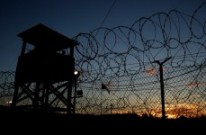Inayat Bunglawala comments on the report that journalists were tipped off the night before the police raids that led to the arrests of nine men in Birmingham over an alleged plot to behead a British Muslim soldier.
Category Archives: State Oppression
Terror leaks: both Home Office and police implicated
 The row over allegations that lives were endangered by leaks about major anti-terrorism operations deepened last night as it emerged that there were a series of disclosures about one highly sensitive investigation.
The row over allegations that lives were endangered by leaks about major anti-terrorism operations deepened last night as it emerged that there were a series of disclosures about one highly sensitive investigation.
As Tony Blair rejected calls for an inquiry, and Liberal Democrats called upon the police to investigate, it emerged that journalists received up to three separate briefings about an allegation that a group of men was planning to abduct and behead a Muslim British soldier.
The Guardian has been told that an aide to John Reid, the home secretary, was responsible for one of those leaks, and has also learnt that there is strong suspicion among the highest-ranking police at Scotland Yard that one of their own officers also briefed the media. The controversy centres on a series of raids which led to nine arrests across Birmingham in February. Six men were subsequently charged with a number of terrorist offences.
Defence lawyers are expected to argue that it will be impossible for any of the men arrested in Birmingham to receive a fair trial as a consequence of the leaks at the time of their arrest. One lawyer, Tayab Ali, said he had been told by a senior West Midlands officer that the disclosures may have been an offence under the Official Secrets Act.
Swedish security police ‘harasses Muslims’
A major crisis management training exercise taking place in Stockholm next week will contribute to further stigmatization of Muslims, according to two leading members of the Green Party. “The security police constantly engages in harassing Muslims and actively contributes to fuelling Islamophobia,” wrote Stockholm’s opposition vice mayor Yvonne Ruwaida and member of parliament Mehmet Kaplan on Dagens Nyheter‘s opinion page.
The politicians believe that the crisis exercise which the Swedish Emergency Management Agency (Krisberedskapsmyndigheten) is starting on Wednesday will follow this pattern. Around 4,000 people will participate in the exercise and the scenario which they will attempt to deal with is described as “a terrorist attack with weapons of mass destruction”.
The terrorists in the exercise have been given the fictional name of ‘Bogalanders’. They live in one of the predominantly immigrant “Million Homes” areas, their religion is split into two factions and they are protesting against the occupation of holy ground in “Bogaland”. “The parallels with Muslims and Islam are not exactly hard to find,” wrote Kaplan and Ruwaida.
Study exposes discrimination against Muslim prisoners
 The Prison Service’s attempts to curb the growth of radical Islam in jails by restricting communal prayers and reading of the Qur’an during work breaks are exacerbating the problem, according to the first in-depth study of Muslim prisoners. The research, based on interviews with 170 current and former Muslim prisoners, also reveals that bans on access to certain TV programmes and newspapers in high-security prisons have also backfired.
The Prison Service’s attempts to curb the growth of radical Islam in jails by restricting communal prayers and reading of the Qur’an during work breaks are exacerbating the problem, according to the first in-depth study of Muslim prisoners. The research, based on interviews with 170 current and former Muslim prisoners, also reveals that bans on access to certain TV programmes and newspapers in high-security prisons have also backfired.
The four-year research project by Aberdeen University anthropologist Gabriele Marranci also finds that a small minority of former young Muslim offenders are vulnerable to recruitment by militant organisations as a result of their prison experiences. “I found no evidence to suggest that the Muslim chaplains are behaving or preaching in a way that facilitates radicalisation,” said Dr Marranci. “On the contrary, my findings suggest that they are extremely important in preventing dangerous forms of extremism. However, the distrust that they face, both internally and externally, is jeopardising their important function.”
The research shows that Muslim prisoners were subject to stricter surveillance than other inmates, especially when they adopted religious symbols such as beards, veils and caps: “Growing a beard is, in almost all establishments I visited, interpreted as ‘radicalisation’ of the individual,” said Dr Marranci, a lecturer in the anthropology of religion. He warns that the continuing atmosphere of suspicion surrounding Muslim prisoners increases a sense of frustration and depression which a strong view of Islam can help to overcome.
Relatives of interned Japanese-Americans side with Muslims
Holly Yasui was far away when a federal judge in Brooklyn ruled last June that the government had wide latitude to detain noncitizens indefinitely on the basis of race, religion or national origin. The ruling came in a class-action lawsuit by Muslim immigrants held after 9/11. But Ms Yasui, an American citizen of Japanese ancestry, had reason to take it personally.
Her grandparents were among thousands of Japanese immigrants in the United States who were wrongfully detained as enemy aliens during World War II. And her father was one of three Japanese-Americans who challenged the government’s racial detention and curfew programs in litigation that reached the Supreme Court in the 1940s.
Now, Ms Yasui, along with Jay Hirabayashi and Karen Korematsu-Haigh, a son and a daughter of the two other Japanese-American litigants, is urging an appeals court in Manhattan to overturn the sweeping language of the judge’s ruling last year.
The ruling “painfully resurrects the long-discredited legal theory” that was used to put their grandparents behind barbed wire, along with the rest of the West Coast’s Japanese alien population, the three contend in an unusual friends-of-the-court brief filed today in the United States Court of Appeals for the Second Circuit.
In recent years, many scholars have drawn parallels and contrasts between the internment of Japanese-Americans after the attack on Pearl Harbor, and the treatment of hundreds of Muslim noncitizens who were swept up in the weeks after the 2001 terror attacks, then held for months before they were cleared of links to terrorism and deported.
Four years in Guantánamo – the man who said no to MI5
 British resident Jamil el-Banna, 44, knew Abu Qatada, a cleric accused of being al-Qaida’s spiritual leader in Europe.
British resident Jamil el-Banna, 44, knew Abu Qatada, a cleric accused of being al-Qaida’s spiritual leader in Europe.
In 2002 Mr Banna, a father of five from London, was seized by the CIA and secretly flown to Guantánamo Bay, after MI5 wrongly told the Americans that his travelling companion was carrying bomb parts on a business trip to Gambia.
On Friday, his companion, Bisher al-Rawi, was released without charge after four years in the US detention camp, after it emerged that he had helped MI5 keep track of Qatada. But Mr Banna’s incarceration in Cuba continues.
It has now emerged that only days before Mr Banna’s arrest, MI5 visited him at his home and attempted to recruit him as an informer, with the lure of a new identity, relocation and money. The Guardian has obtained this MI5 document in which the intelligence officer details, in his own words, that encounter.
Hicks case exposes ‘war on terror’ sham
“After five years of solitary confinement in a small metal cell, David Hicks pleaded guilty on March 26 to one of the two charges brought against him by US military prosecutors on March 1, to finally get out of the notoriously brutal US military prison at Guantanamo Bay. Hicks’s case has revealed just what a sham the US-led ‘war on terror’ really is.
“For five years Washington, backed to the hilt by Canberra, has claimed that Hicks was one of the most dangerous ‘terrorists’ being held at Guantanamo. He was charged with offences that carrying life sentences. Now, under the plea bargaining deal, his US military prosecutors are talking about him being able to be ‘home before the end the year’. Indeed, on March 31, Hicks was sentenced to seven years’ imprisonment, with all but nine months of the sentence suspended. He will serve most of this in an Australian civilian prison.”
Call that humiliation?
“I share the outrage expressed in the British press over the treatment of our naval personnel accused by Iran of illegally entering their waters. It is a disgrace. We would never dream of treating captives like this – allowing them to smoke cigarettes, for example, even though it has been proven that smoking kills. And as for compelling poor servicewoman Faye Turney to wear a black headscarf, and then allowing the picture to be posted around the world – have the Iranians no concept of civilised behaviour? For God’s sake, what’s wrong with putting a bag over her head? That’s what we do with the Muslims we capture: we put bags over their heads, so it’s hard to breathe. Then it’s perfectly acceptable to take photographs of them and circulate them to the press because the captives can’t be recognised and humiliated in the way these unfortunate British service people are.”
Terry Jones in the Guardian, 31 March 2007
And you thought there couldn’t be anyone worse than Ruth Kelly? Think again
John Reid has won a cabinet battle to become Britain’s “security supremo” under a plan for the Home Office to co-ordinate the fight against terrorism. A plan to split the Home Office into two separate security and justice departments is expected to be given the go-ahead by the Cabinet today.
Under the biggest changes to the Home Office in its 225-year history, the Home Secretary will take charge of counter-terrorism. Crucially, he will be responsible for all security threats to the UK, and the “contest” strategy against al-Qa’ida, now under the Cabinet Office.
The Home Office will also take charge of “winning the hearts and minds” of Muslims in Britain, currently shared with the Foreign Office and the Department of Communities and Local Government.
Belfast Telegraph, 29 March 2007
See also Financial Times, 29 March 2007
Muslim face veil banned in Quebec vote
MONTREAL – Muslim women will have to remove their face coverings if they want to vote in upcoming elections in Quebec, a government official said Friday, reversing his earlier decision to allow the veils.
Marcel Blanchet, the French-speaking province’s election chief, had been criticized by Quebec’s three main political leaders for allowing voters to wear the niqab, which covers the entire face except for the eyes, if they signed a sworn statement and showed identification when they vote.
But Blanchet reversed his earlier decision Friday, saying it was necessary to avoid disruptions when residents go to the polls. “Relevant articles to electoral laws were modified to add the following: any person showing up at a polling station must be uncovered to exercise the right to vote,” he said.
Blanchet had to get two bodyguards after the Quebec elections office received threatening phone calls and e-mails following his initial decision to allow niqabs.
The reversal was condemned by Muslims groups who said it could turn their members away from the polls. “I am so saddened, I doubt many of these women will show up at the polls on Monday after all this mockery,” said Sarah Elgazzar of the Canadian Council on American-Islamic Relations.
Last week in Quebec, a young Muslim woman was forced to quit her job at a prison after she refused to remove her headscarf. The public security department supported the decision, citing security concerns, but Muslim groups pointed out that the Canadian Armed Forces allow women to wear headscarves on active duty.
Last month, an 11-year-old Muslim girl from Ontario participating in a soccer tournament in Quebec was pulled from the field after she refused the referee’s request to remove her headscarf.
